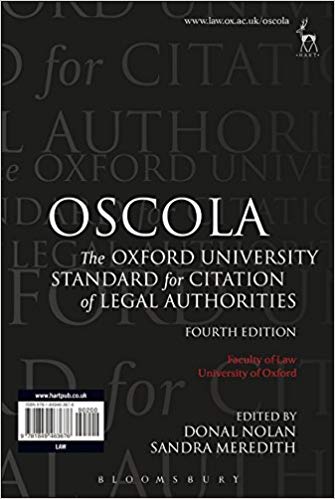-
5-minute read
-
3rd October 2019
Legal Citations: What Is OSCOLA Referencing?
Have you been asked to use OSCOLA referencing in a document? Or are you writing about UK law and need to know how to cite sources? Well, you’ve come to the right place. In this post, we’ll explain the basics of the OSCOLA system, including how to cite sources and how to compose a bibliography.
What Is OSCOLA Referencing?

OSCOLA refers to the Oxford Standard for Citation of Legal Authorities. This style guide, developed by the Oxford Law Faculty, sets out a standard method of legal citation. Currently on its fourth edition, the OSCOLA system has been adopted by most law schools and legal publishers in the UK.
OSCOLA divides sources into “primary” and “secondary” sources. Primary sources are legal sources (e.g., cases and legislation). Secondary sources include everything else (e.g., books, journal articles, and websites). Typically, you will cite sources in footnotes in OSCOLA referencing. In addition, most of the time, you will create a list of the sources you have cited for a bibliography at the end of the document.
Primary Sources in OSCOLA Referencing
The format for citing case law in OSCOLA referencing varies depending on whether the case has a neutral citation. This is a unique reference given to a judgment by the UK’s HM Courts and Tribunals Service, making it easier to find judgments (especially for unreported cases).
A neutral citation includes a year, a court abbreviation and a court-assigned number. For instance, we could format a neutral citation as follows:
|
Case Name |
Year of Judgment |
Court Abbreviation |
Neutral Citation Number |
|
Corr v IBC Vehicles |
[2008] |
UKHL |
13. |
If you are citing an unreported case, the neutral citation alone will suffice. However, cases from before 2001 may not have a neutral citation. And in most cases, you will also want to cite a law report.
Find this useful?
Subscribe to our newsletter and get writing tips from our editors straight to your inbox.
Subscribe to Beyond the Margins and get your monthly fix of editorial strategy, workflow tips, and real-world examples from content leaders.
- Neutral Citation
Corr v IBC Vehicles [2008] UKHL 13. - Neutral Citation with Law Report
Corr v IBC Vehicles [2008] UKHL 13, [2008] 1 AC 884. - Law Report with No Neutral Citation
Page v Smith [1996] AC 155 (HL).
For UK legislation, you will typically just need the short name and a year:
The concept of heresy changed with the Act of Supremacy 1558.
You can find out more about citing case law and legislation in our blog post here. In addition, OSCOLA has published a supplement [PDF] about citing international law to accompany the third edition. You can use this for reference when citing international or European treaties.
Secondary Sources in OSCOLA Referencing
The format for secondary sources in OSCOLA referencing varies depending on the source type. Citing a print book, for instance, differs from citing a website or online video. However, there are some general principles that apply to various secondary sources, including:
- Citations should typically provide the author’s first name (or initial) and surname, as well as the source title and publication information.
- For sources with more than three authors, give the first name listed on the source followed by “and others” in place of the other names.
- If a source has no named author, use the publishing organization instead.
- Italicize titles of books and any other publication with an ISBN.
- Provide a valid URL for publications that are available online.
For more information on secondary sources, see our blog post on the topic.
How to Create an OSCOLA Bibliography
Officially, the fourth edition of OSCOLA says that “shorter works, such as articles and essays, generally only require footnotes.” As such, you may not need a bibliography at all. However, in practice, most law schools will want you to include one. And in any document more than a few pages long, a bibliography can be very useful for readers.
The rules for composing an OSCOLA bibliography, then, are as follows:
- Divide the bibliography into three sections: “Table of Cases” (case law), “Table of Legislation” (legislation), and “Bibliography” (all other sources).
- List statutory instruments separately at the end of the table of legislation.
- Do not italicize case names, unlike elsewhere in the text and in footnotes.
- Use the first significant word from case titles to sort sources alphabetically.
- If a source has an author, give their surname first, followed by an initial.
- There is no need for a period at the end of bibliography entries.
There is some flexibility in this. For instance, if you have relatively few primary sources, you could list cases and legislation together in a “Table of Authorities.” Or if you have cited multiple cases from different jurisdictions, you could list them separately (e.g., “UK Cases” and “EU Cases”).
In all cases, though, make sure sources are listed clearly and consistently.
US Legal Referencing Systems
While OSCOLA is the main form of legal citation in the UK, there are two systems used in the US:
- Bluebook referencing – The most established citation system in US law. Find out about citing cases and legislation in this system on our blog.
- ALWD referencing – A system similar to Bluebook, but with a few simplifications that may make it easier to use.
As such, if you’re writing about US law, you will usually need one of these systems. And if you’d like someone to check the referencing in a legal document, we’re always here to help.




